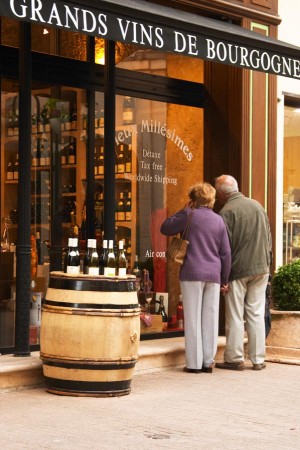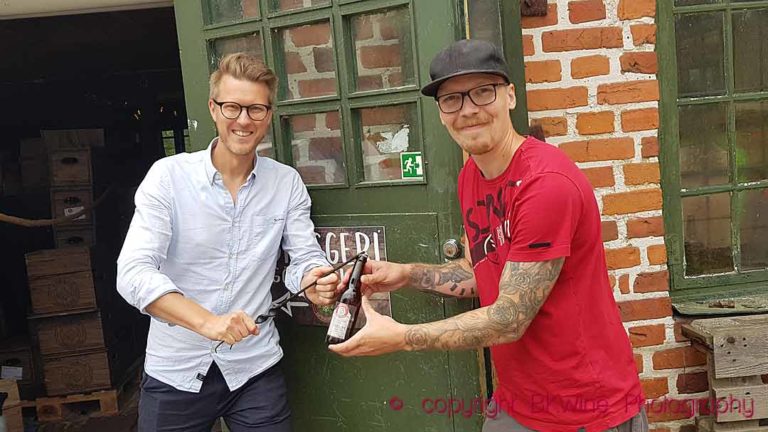There are currently several ways for Swedes to buy wine, although there is supposedly a monopoly. “Direct import”, where you order wine from another country, from a winery or a wine shop, is one. Here is some information on how this works with details on how to do it. Plus some speculation on what the risks are if you ignore the rules and just order.
[box type=”info”]Even though this article mainly focuses on how things are done in Sweden, I imagine that the procedure is similar in other “restrictive” EU countries regarding the need for “accompanying document” etc.[/box]
Systembolaget, the so-called “monopoly”, currently has only around a 60% market share. In other words, the Swedes buy 40% of the alcohol that is consumed through other channels. One can wonder how effective such a “monopoly” is for managing the national alcohol policy and the public health, but I’ll have to come back to another time.

There are several different options for Swedes to buy wine (and other alcohol) today:
- The Systembolaget shops, with its comparatively rather limited range
- From Swedish wine importers, sold and delivered through Systembolaget via the so-called “order selection” managed by the importer (see here for a list of Swedish wine importers)
- “Private imports” through Systembolaget (a customer can request that the monopoly imports any product, but in practice it is slow, cumbersome and very expensive)
- From “Swedish” internet shops (see here for a list of “Swedish” internet wine shops), with two variations:
- Internet shops registered with the tax authorities and that pay alcohol tax on the buyer’s behalf. This is what is called “distance sales” (?), or “distansförsäljning” in Swedish.
- Internet shops not registered with the tax authorities and that leaves it to the buyer to pay alcohol tax. Many, including government authorities, as well as internet shops in the previous group, do not think this is legal, unless the buyer fulfils very precise prerequisites (see below).
- From wine shops or wine producers anywhere in Europe
Let’s add to this a few more “channels”:
- Travel entry: what people carry with them when travelling across the border
- Restaurant sales
- Illegal sales
- Smuggling
- Home production
It is number 1 and number 2 (and probably the infinitesimal quantity of No. 3) which is included in “monopoly sales,” and that only reach around 60% of all alcohol consumption.
In this article I will look at No. 5, how to order wine from any winery or wine merchant any anywhere within the European Union. It is important to note “in the EU” because the rules only apply to sellers in EU-Europe (but outside Sweden). If you want to buy directly from eg the United States or Switzerland, it is not nearly as easy.
It may also be wise to note that exactly how the rules work is still somewhat a matter of interpretation, and even different agencies do not always agree.
Thank you EU!
We can thank the EU for that today it is possible to buy directly from suppliers located outside Sweden but within the EU. It was thanks to an EU directive that Sweden in 2008 was forced to allow individuals to buy wine (and spirits and beer) from sellers in other EU countries.
How to buy wine from wine merchants and wine producers
So, how does it work if you – a private individual! – want to buy wine (plus a number of other specially-taxed goods) from a seller in the EU but outside Sweden, and want to do everything according to all the rules?
Here’s a description that follows the Swedish tax authorities interpretation of the law (somewhat simplified):
- The buyer must arrange the transport (see more below)
- The buyer must inform the tax authorities in advance, using a special form (SKV 5386)
- The buyer must deposit money as a guarantee for the future tax with the tax authorities with an amount equal to the expected excise duty (alcohol tax). In other words, you must calculate yourself the tax (not difficult!) and pay it in advance.
- An “accompanying document” must be included with the goods. More on this below.
- When the goods arrive in Sweden the buyer must file a special excise tax return with the tax authorities.
Not easy, but not impossible. At the end of this article, you can find a link to a brochure from the Tax Office that gives you a lot more detail. It may look intimidating initially but is probably not that complicated in practice.
The buyer arranges for shipment
That “the buyer arranges transport” is essential. It must above all be paid separately (the payment is, well, presumably the only thing that shows who had contact with the carrier). If the seller, the winery or shop, includes the shipping cost on the invoice it is not acceptable, according to the tax authorities.
If the seller does include shipping on the invoice, he must, according to the tax authorities, be registered in Sweden and make similar declarations as described above. Or rather, he has to be registered for “distance sales”. (It is on this rule that many believe that some on-line stores fail, those that are not registered and do not pay the tax on behalf of the buyer, instead leaving it up to the buyer to pay the tax.)
I do not know to which extent this rule is strictly enforced. It’s of course almost always the case that when selling goods the seller includes the transportation cost on the invoice. To then say that the opposite must be done for tax reasons seems almost to be a construction with the sole purpose to make the process almost impossible.
Accompanying documents
It is the buyer that has to make sure that there is an “accompanying document” (sometimes called “simplified accompanying document”) with the shipment but it is of course the seller who will (or can) put it in the packaging. If you (the buyer) ask kindly then it will probably not be a problem to have it arranged. It will be even easier if the buyer completes it and just hands it to the seller.
According to the rules, the document must be issued on a form from the seller’s country (available from that country’s administration), but it is the buyer who is responsible for ensuring that the document exists. The buyer can “give power of attorney” to the seller to do it (I don’t believe that has to be in any formal way) if they are on friendly footing. However, see the comment below.
- The Swedish version of the accompanying document is available here.
- The French document: Cerfa n ° 10752 Document simplifié d’accompagnement – Circulation intra communautaire – Produits déjà mis à la consommation
- The English form: Simplified Accompanying Document can be ordered here and could possibly be in PDF format somewhere.
- German form: Verbrauchsteuerplichtige Waren Begleitdokument
The document is a standard EU form so in practice it is enough to read the instructions in any of the languages and then you can actually use any language version. “Usually it is the Swedish form that people use” was the answer I had from the Swedish Tax Authorities when I asked the question. In other words, don’t worry about finding the foreign language version.
I also received the following helpful instructions:
When you complete the form you can put your own name both as sender and receiver but you should put the suppliers name as c/o address in the box for sender. In box #4 you can use for example the invoice number as reference and in box #6 you should put the reference number (“diarienummer” that you have received from us [the Tax Administration]. Then you should not have any problems. You send the form to the seller so that he can put it in the shipping with the goods.
I do not know how important it is that there actually is an accompanying document. If the buyer has paid the tax (with the guarantee deposit) but there is no accompanying document, what happens?…
It seems that the tax authorities that deal with this are actually very helpful with questions! When I had a question I had a very kind answer on email within a few days.
Update: What about VAT?
I recently had the question: “What about VAT? Do I need to pay that in Sweden?”
Good question! VAT (value added tax, “moms” in Swedish, TVA in French, IVA in Italian) is not at all mentioned in the information document from the Swedish tax authorities. I was not sure of the answer so I decided to investigate.
I contacted the Swedish tax authorities and received a very prompt answer (kudos!). The answer is yed and no, it depends.
If a private individual buys directly from a seller in another country (within the EU) then the VAT is already paid in the country of origin.
This is what the tax-man said:
“Private individuals do not need to pay VAT in Sweden for alcohol that they have bought in other [EU] member states. Thus it is only the alcohol tax that should be paid in Sweden in this case. In the case that there is some sort of company involved in the sale, for example in the case of ‘distance sales’ (*) then both VAT and alcohol taxes should be paid in Sweden.”
(*) “distance sales” is the term used for internet shops (and similar) that specifically target Swedish consumers, with Swedish language we sites. You can find our long list of Swedish distance sellers’ wine shops here.
And if you disregard all that, and just buy?
It is quite a complicated or at least convoluted procedure to follow all of this. At least the first time you do it. Now, if you find it too complex and simply ignore it, what happens then?
Many wine sellers in Europe, both wineries, wine shops and internet wine sites routinely sell on “mail order” or over the internet. One can easily order wine and have it delivered to the home. In any other country than the Nordics it would be normal procedure. It is simple and easy: you order what you want and pay a modest shipping charge. Just like the way it would work in Sweden if we did not have the monopoly.
You can do exactly the same thing if you happen to live in Sweden: Order from of a shop, or from a producer in England, in France, in Italy etc and then ask him to arrange shipping to your home. Many sellers would not hesitate at all to do that.
There are many stories told on the internet about people in Sweden who have just simply ordered wine from any shop in the EU and had it sent home. In most cases (if not all) it seems to work fine, even without going through all the formalities described above! In some cases they pay Swedish taxes in advance, to be on the safe side, in other cases they don’t. It seems to be very rare that there is any problems at all. You can find some more details on how to buy from any shop or wine producer and have the wine sent to Sweden here (article in Swedish though).
What’s the risk? Can the confiscate my wine?
The risk is that the buyer runs is that the delivery may get stuck in customs since the procedure above has not been followed.
Is the risk great?
I do not know. I have never tried it. (I live in France and this is not a problem. We often order wine with home delivery.) But from what I have heard from people who have tried, or on blogs, forums, etc, in most cases it works without any problem. Most deliveries arrive to the destination to the buyer’s door without getting “stuck” in customs.
Will they put me in jail?
If it were to go bad, and the package is stopped in customs, it seems as if it would still not be a great catastrophe. This is what it says on the Customs Administration’s site (in unofficial translation):
“Question: What happens if I do not report and provide bank deposit for the tax but just order alcohol products via the internet? Answer: If the shipment of alcoholic products is found, the Customs Service will seize the alcohol products. The person responsible for paying the tax will be taxed on the goods (alcohol excise duty) plus a transportation fee of 20% of the alcohol tax.”
“Question: What happens after I have paid the tax on alcohol? Answer: The seizure is lifted. The person claiming the goods (tax liable / recipient) is responsible picking up the goods from the Customs administration. If you ordered alcohol products including transportation, you should agree with the carrier who should pick up the alcohol products. If the carrier will make the pick-up you should give him a written authorisation to do so. “
[box type=”info” style=”rounded” border=”full”]A good opportunity to test any of the above mentioned methods is on a wine tour. Take a look at the wine tour programmes from BKWine and you might find something that looks tempting.[/box]
Sources
For more information:
- Swedish Customs Office: Alcohol from another EU country
- Swedish Tax Authorities: Brochure “private imports of alcohol and tobacco products”
- FineWines.se Forums: Buying wine through sources other than Systembolaget, rules, transportation and shops
- Swedish Tax Authorities: Distance sales of alcohol (i.e. internet wine shops)
A special thanks to FineWines.se (see above) who contributed much information and many of the original source references.
I might add that in the forum thread i nthe bullet point above on FineWines.se there are also many comments and advice on how it works when shopping at various web shops in Europe. Good and bad experiences from different sites!
What is your experience?
It would be interesting to hear what your experiences of this. Write a comment!
[box type=”alert” style=”rounded” border=”full”]IMPORTANT: THIS IS JUST A LAYMAN’S DESCRIPTION OF HOW I INTERPRET THE RULES. IT SHOULD IN NO WAY BE INTERPRETED AS LEGAL ADVICE. EVERY INDIVIDUAL CONSIDERING BUYING WINES SHOULD MAKE SURE HE HAS SUFFICIENT INFORMATION ABOUT RULES AND REGULATIONS.[/box]










2 Responses
“I have a theory”…
Som I måske ved, har jeg valgt at ikke længere sende vin til private kunder i Sverige.
HVAD ANDRE GØR
Mange af jer gør mig opmærksom på, at der er andre danske og tyske
kollegaer der bliver ved med at sende til private i Sverige UDEN at de
er registreret som “distantforsäljarer” hos Skatteverket.
Jeg kan kun svare for mig selv og for mit firma.
Naturligvis er det konkurrenceforvridende, at Skatteverket/Tullan
ikke er mere aktive på dette felt, men både som udlænding og som
vinhandler kan jeg næppe blande mig i den del af sagen og
i interne svenske affærer.
Den officielle indstilling (marts 2013) fra Skatteverket kan resumeres her:
” Tyvärr så är det så att finns många bolag i Europa som medvetet eller omedvetet
sålt alkohol till svenska kunder utan att vara
registerade som distansförsäljare. Vissa har blivit kontaktade av Skatteverket
och uppmanade att registera sig, men kontrollinsatsen
har tyvärr varit begränsad.
Förhoppningsvis kommer insatserna att utökas de kommande åren så att
de seriösa aktörerna inte utsätts för en illojal konkurrens.”
MEDDELAKTIG ??
Der er dog et aspekt, der måske kan tåle mere belysning: hvis det er rigtigt at
man kan ikke forlange at politiet fanger alle forbrydere, det er lige så rigtigt
at Skatteverket har alle de “operators”, der sender vin til Sverige på et “sweet spot”: nettet.
Det burde kræve meget lidt indsats og få resourcer at efterchecke at alle de vinhandlere
i de mange vinblogs, der bliver nævnt som vinleverandører, også har deres svenske skattepapirer i orden.
Ved ikke at være mere aktiv på denne front er Skatteverket indirekt medskyldig til
både konkurrenceforvridning og mangel på indtægt i de svenske statskasser ?
Spørgsmålet er lige så berettiget som uvedkommende for min del af vinhandel:
i venten på at Skatteverket “utökar insatserna” må jeg bekæmpe den “illojala konkurrens”
med stadigvæk bedre vine og bedre MUK priser!
Men jeg kan ikke undlade at spørge mig selv: er det tænkeligt at Skatteverket/Tullan lukker
et øje og gerne to for ikke at genere de vinproducerende EU-partners ? eller er der andre rimelige forklaringer til at “kontrolinstansen har tyvärr varit begränsad” ??
Ciao,
Carlo
Carlo,
Jag kopierar over din kommentar har till den svenska versionen av denna artikel:
https://www.bkwine.com/sv/reportage/mer/kopa-vin-direkt-fran-vinproducent-eller-vinhandlare-i-utlandet-direktimport/#comment-9099
Och har aven skrivit en kommentar dar, som jag undrar vad du har for synpunkter pa.